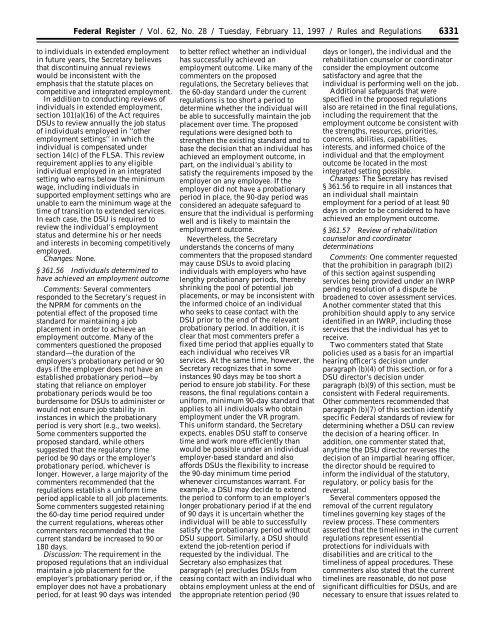federal register - U.S. Government Printing Office
federal register - U.S. Government Printing Office
federal register - U.S. Government Printing Office
Create successful ePaper yourself
Turn your PDF publications into a flip-book with our unique Google optimized e-Paper software.
Federal Register / Vol. 62, No. 28 / Tuesday, February 11, 1997 / Rules and Regulations6331to individuals in extended employmentin future years, the Secretary believesthat discontinuing annual reviewswould be inconsistent with theemphasis that the statute places oncompetitive and integrated employment.In addition to conducting reviews ofindividuals in extended employment,section 101(a)(16) of the Act requiresDSUs to review annually the job statusof individuals employed in ‘‘otheremployment settings’’ in which theindividual is compensated undersection 14(c) of the FLSA. This reviewrequirement applies to any eligibleindividual employed in an integratedsetting who earns below the minimumwage, including individuals insupported employment settings who areunable to earn the minimum wage at thetime of transition to extended services.In each case, the DSU is required toreview the individual’s employmentstatus and determine his or her needsand interests in becoming competitivelyemployed.Changes: None.§ 361.56 Individuals determined tohave achieved an employment outcomeComments: Several commentersresponded to the Secretary’s request inthe NPRM for comments on thepotential effect of the proposed timestandard for maintaining a jobplacement in order to achieve anemployment outcome. Many of thecommenters questioned the proposedstandard—the duration of theemployers’s probationary period or 90days if the employer does not have anestablished probationary period—bystating that reliance on employerprobationary periods would be tooburdensome for DSUs to administer orwould not ensure job stability ininstances in which the probationaryperiod is very short (e.g., two weeks).Some commenters supported theproposed standard, while otherssuggested that the regulatory timeperiod be 90 days or the employer’sprobationary period, whichever islonger. However, a large majority of thecommenters recommended that theregulations establish a uniform timeperiod applicable to all job placements.Some commenters suggested retainingthe 60-day time period required underthe current regulations, whereas othercommenters recommended that thecurrent standard be increased to 90 or180 days.Discussion: The requirement in theproposed regulations that an individualmaintain a job placement for theemployer’s probationary period or, if theemployer does not have a probationaryperiod, for at least 90 days was intendedto better reflect whether an individualhas successfully achieved anemployment outcome. Like many of thecommenters on the proposedregulations, the Secretary believes thatthe 60-day standard under the currentregulations is too short a period todetermine whether the individual willbe able to successfully maintain the jobplacement over time. The proposedregulations were designed both tostrengthen the existing standard and tobase the decision that an individual hasachieved an employment outcome, inpart, on the individual’s ability tosatisfy the requirements imposed by theemployer on any employee. If theemployer did not have a probationaryperiod in place, the 90-day period wasconsidered an adequate safeguard toensure that the individual is performingwell and is likely to maintain theemployment outcome.Nevertheless, the Secretaryunderstands the concerns of manycommenters that the proposed standardmay cause DSUs to avoid placingindividuals with employers who havelengthy probationary periods, therebyshrinking the pool of potential jobplacements, or may be inconsistent withthe informed choice of an individualwho seeks to cease contact with theDSU prior to the end of the relevantprobationary period. In addition, it isclear that most commenters prefer afixed time period that applies equally toeach individual who receives VRservices. At the same time, however, theSecretary recognizes that in someinstances 90 days may be too short aperiod to ensure job stability. For thesereasons, the final regulations contain auniform, minimum 90-day standard thatapplies to all individuals who obtainemployment under the VR program.This uniform standard, the Secretaryexpects, enables DSU staff to conservetime and work more efficiently thanwould be possible under an individualemployer-based standard and alsoaffords DSUs the flexibility to increasethe 90-day minimum time periodwhenever circumstances warrant. Forexample, a DSU may decide to extendthe period to conform to an employer’slonger probationary period if at the endof 90 days it is uncertain whether theindividual will be able to successfullysatisfy the probationary period withoutDSU support. Similarly, a DSU shouldextend the job-retention period ifrequested by the individual. TheSecretary also emphasizes thatparagraph (e) precludes DSUs fromceasing contact with an individual whoobtains employment unless at the end ofthe appropriate retention period (90days or longer), the individual and therehabilitation counselor or coordinatorconsider the employment outcomesatisfactory and agree that theindividual is performing well on the job.Additional safeguards that werespecified in the proposed regulationsalso are retained in the final regulations,including the requirement that theemployment outcome be consistent withthe strengths, resources, priorities,concerns, abilities, capabilities,interests, and informed choice of theindividual and that the employmentoutcome be located in the mostintegrated setting possible.Changes: The Secretary has revised§ 361.56 to require in all instances thatan individual shall maintainemployment for a period of at least 90days in order to be considered to haveachieved an employment outcome.§ 361.57 Review of rehabilitationcounselor and coordinatordeterminationsComments: One commenter requestedthat the prohibition in paragraph (b)(2)of this section against suspendingservices being provided under an IWRPpending resolution of a dispute bebroadened to cover assessment services.Another commenter stated that thisprohibition should apply to any serviceidentified in an IWRP, including thoseservices that the individual has yet toreceive.Two commenters stated that Statepolicies used as a basis for an impartialhearing officer’s decision underparagraph (b)(4) of this section, or for aDSU director’s decision underparagraph (b)(9) of this section, must beconsistent with Federal requirements.Other commenters recommended thatparagraph (b)(7) of this section identifyspecific Federal standards of review fordetermining whether a DSU can reviewthe decision of a hearing officer. Inaddition, one commenter stated that,anytime the DSU director reverses thedecision of an impartial hearing officer,the director should be required toinform the individual of the statutory,regulatory, or policy basis for thereversal.Several commenters opposed theremoval of the current regulatorytimelines governing key stages of thereview process. These commentersasserted that the timelines in the currentregulations represent essentialprotections for individuals withdisabilities and are critical to thetimeliness of appeal procedures. Thesecommenters also stated that the currenttimelines are reasonable, do not posesignificant difficulties for DSUs, and arenecessary to ensure that issues related to


